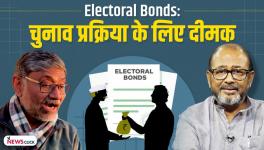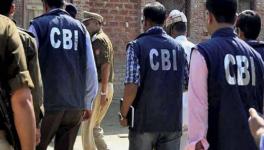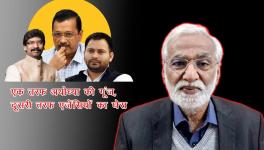2G Scam - Chidambaram's role officially acknowledged
With notes of Pranab Mukherjee and role of P Chidambaram becoming the focus, the ghost of 2G spectrum scam keeps haunting the UPA, especially Congress. Eminent Journalist Paranjoy Guha Thakurta speaks to Newsclick on the issue.
Rough Transcript
Prabir Purkayastha (PP): Hello and welcome to Newsclick. Today we have with us Paranjoy Guha Thakurta, eminent journalist and also one of the petitioners in the 2G case in the Supreme Court. It has been argued for quite some time that finance ministry has really not been involved in fixing the issue of license fees and it did not give concurrence to Raja's position that they should be given on first-come-first-served basis on 2001 prices. It has been argued that Chidambaram and Raja had met and no concurrence was really given and no minutes were kept of this. So Raja has argued at different places and made statements that Chidambaram was fully involved, yet concurred with the prices, he had concurred with 2001 prices being accepted and there is no final difference between Chidambaram and Raja on this. What does the current report indicate?
Paranjoy Guha Thakurta (PGT): I think we have to take little more nuanced view of the issue because clearly what has now happened in the 2G scam case is that the spotlight is on Mr. Chidambaram. We have to first look at the circumstances that led to the award of licenses on Jan 10, 2008 and then look at what happened thereafter. Moreover, it's also very important to, in this case at least, distinguish between the Ministry and the Minister. In the weeks and the months before the award of licenses or the letters of intent, I should say – on Jan 10, 2008, there is evidence that Mr. D Subbarao who was the then Finance Secretary, who is currently the Governor of the Reserve Bank of India. Dr. Subbarao had written a series of letters to his counterpart in the Department of Telecommunications, i.e. Siddharth Baruah, before him Mr. Mathur. Mr. Subbarao was writing to his counterpart in the DoT and what he had clearly indicated that the manner in which each license was sought to be valued. It is not just a piece of paper, it is not just a license. Because bundled with that license was electromagnetic spectrum which was very very precious, which is very very scarce. To price it at 2001 rates when it was discovered by the the auction wasn't the opinion of Subbarao and the officials of Ministry of Finance, clearly not on. He says, either you have public auction or you have some sort of indexation of market mechanism to derive it's true market value. What happened thereafter was that the DoT under Mr Raja overruled every objection of Ministry of Finance and went ahead and awarded those letters of intent. What happened after that? It now subsequently transpired that there were meetings between Mr. Raja and Mr Chadambaram in the presence of Mr Baruah, who is in jail, and Mr Subbarao, their secretaries, wherein it was mentioned in the minutes, the same meeting which was supposed to be not minuted. Now the minutes indicate that the Finance Minister said in the note that he is not seeking to revisit the situation prevailing. Even at that stage, it was just letters of intent. The government could, theoretically, have stalled the process. But it did not. Because the Finance Minister chose not to revisit the process.
PP: The issue that really comes up is the fact that not only Mr Chidambaram overruled his secretary, which is he is well within his powers to do, but he also publicly, at least his colleagues in Parliament, said that no notes were kept of the meeting and no formal minutes were issued. Now it transpired that is not there.
PGT: There was indeed records of the meeting took place. It is not that all meetings are necessarily minuted; but in this case the meeting was minuted. Because we also have Prime Minister's Office involved in this and we also have Mr Pulock Chatterji's meeting notes.
You know what is coming out is something very very curious. It also explains why the government went out of it's way to ensure that public accounts committee, the first draft report that was prepared by Dr Murli Manohar Joshi, was not adopted by the account committee. And by a very thin margin. There were 21 members. 11 members opposed it, ten members supported it. The same Murli Manohar Joshi is now trying to have another report. But in that report he was critical of Mr. Chidambaram's role saying that he tacitly approved. He may not have explicitly approved.
Now what happened thereafter, the Prime Minister himself has acknowledged in his media interviews that initially there was divergence of views between the Depratment of Telecommunications and North Block which is the headquarter of Ministry of Finance. Thereafter he says there was a concurrence of views. How exactly was there a concurrence of views when the secretaries of the two departments clearly differ and here you have a Minister eventually overruling his secretary. There is another interesting sort of sub theme on this whole thing. In an interview Mr Chidambaram had said they were waiting for a meeting of the Telecom Commission to take place. In that Telecom Commission meeting, his secretary Mr Subbarao participated. But before that Telecom Commission meeting took place, the letters of intent were issued on Jan 10, 2008. Almost preempting that process. So once again we are finding a big question mark. Mr Chidambaram said he did not know that this would happen. Thereafter and this is very interesting, the Prime Minister's Office said that an arms length distance should be maintained. We have an interview given by Dr Montek Singh Ahluwalia, the Deputy Chairman of Planning Commission to Mr Karan Thapar saying that you know when the two Ministries have difference of opinion, eventually the view of the Ministry which has muted the proposal prevails. Now this is strange logic. All along we have been told Ministry of Finance is the big boss and he can actually overrule. There are hundreds of instances where Ministry of Finance has overruled the proposals of other ministries.
PP: Even aside, the correct rules of procedure is if the ministers have disagreement they have to either go to a full cabinet or an Empowered Group of Minsters. This is really the procedure.
PGT: Absolutely. In this case, the law ministry, headed by Mr Hansraj Bharadwaj at that time, had suggested that since there is difference of view between the Ministry of Finance and Department of Telecommunication, there should be an empowered group of ministers. The point is it was not only not referred to an EgoM, it was not even taken up by cabinet committee of economic affairs. Thereafter, Dr Ahluwalia in his interview to Karan Thapar said that this was not to be construed as the Prime Minister Dr Manmohan Singh turning a blind eye to what has happened.
PP: If this is not Nelson's eye what is it? But leaving it aside for time being.
PGT: No, somebody is being economical with the truth. Let's be very clear about that.
PP: It's very clear that the economist in this case Dr Montek Singh Ahluwalia is being very economic with the truth. But coming back to the issues that you have raised earlier – the issue of mergers and acquisitions. This is an issue on which Finance Ministry has even better locus than the issue of license fee and obviously again these terms were also modified and the need of it appeared in the same meeting between Mr. Chidambaram and Raja.
PGT: Essentially what Mr Raja did was that after the letters of intent were issued on Jan 10, 2008, roughly three months later in April that year Mr Raja issued an order suo moto, without taking anybody's consent, changing the rules related to mergers and acquisitions. One crucial element of the rule was that there should be a locking period of three years before the license fee holder could sell its license. Now once again, here again, we see a very clear interpretation of law. One thing is to sell a license and the other is to dilute the equity of the company which has bought the license. In this case, what we found is that the Unitech a company in the Unitech Group and another company which was earlier called Swan and then became DB Etisalat – these companies what they did was that they roped in foreign parties. In the case of Unitech, it was Telenor of Norway; in the case of DB Group it was Etisalat of the United Arab Emirates. What is interesting, subsequently, there was another similar deal involving Tata teleservices and Dokomo of Japan. But just sticking for that matter to Swan/DB Etisalat and also Unitech – what clearly the change in merger and acquisition enabled them to do was to rope in the foreign partners. What was very interesting was the price at which foreign partners purchased the equity clearly indicated that the value of the spectrum behind the license was seven to ten times higher than what had been taken from them. What is worse is that indulging in semantic jugglery by trying to justify what happened by saying this is not sale of license but dilution of equity. It's a bit like the way in which the first-come-first-served system was manipulated. Whether it should be the date of applying for a letter of intent or whether it should be the date on which you pay the amount on the letter of intent or the license fee. It's almost like you shouldn't be selling a resource that belongs to the people of this country – a scarce resource, a national resource, a natural resource in the way in which cinema tickets are sold. That's the first point. But even if you assume that they are selling it and you are standing in the queue and about to reach the box office and say 'oh now it's my turn to get the tickets', then suddenly a bunch of goons pull you back and say 'no the guy behind you will get the ticket'. That's how a system was grossly abused.
PP: There is again some proof to show the people who are sitting in Mr Raja's anti chamber and became number one on the queue. But really now what we are seeing is more sophisticated nuances being expressed. What is selling, what is dilution of equity and what is an associate company, what is not associate company. The Swan was really a part of ADAG group just as Loop Telecom was a part of Essar.
PGT: Once again we are seeing a desperate government trying to use the letter of the law to justify what happened. I think what has also rattled the government is the defense that Mr Raja has taken, Kanimozhi has taken. Their lawyers have clearly said. Firstly, they are saying bring the Prime Minister, summon the Prime Minister. That's certainly not a particularly edifying situation to me. What is more, their lawyers are arguing in the court, if Mr Kapil Sibal, the Telecom Minister, is arguing that there is zero loss, then why the hell are we in jail? If there is no loss to the exchequer, what is the reason to put them behind bar. The way in which this is all playing on, I think the court will take a very very pro-active role. One is the CBI – who is it going to now investigate? It is really going to close the investigations at this juncture. And this whole issue of associate companies. The definition of, who is really an associate company. I will give you a classic example of how this whole tiger, cheetah, leopard was done. Suppose you have three companies A,B and C. A owns 50 per cent of B, B owns 50 per cent of C and C owns 50 per cent of A. So A, B and C claim they are independent corporate entities and not associates. Why? Because neither owns more than 51 per cent of the other.
PP: If you see the larger picture, Mr Chidambaram – lawyer, Mr Kapil Sibal – lawyer...
PGT: Mr Salman Khurshid – lawyer, Mr Veerappa Moily – Law Minister...
PP: You have this entire argument that the government is giving which is to defend what has happened. License has been given at a very low costs, really at throw away prices. But companies have made a killing by reselling the license – dilution of equity, as they are calling it. Then what is that they are willing to accept has been a problem for which Mr Raja is in jail... that actually procedural lapses took place. So the poor man has been in jail for having done procedural lapses while all the money that has been made, apparently done in good faith, because there has been zero loss to the exchequer. This is really the government's argument.
PGT: The government's argument, as you have rightly pointed out, is sounding so weak, so specious, so hollow that I do not think that you have heard the last about the 2G spectrum scam. In a way, in a strange way it's coming back again and again to haunt those who are holding very very important positions, the most important positions in the current government.
PP: You have a brazen scam followed by a brazen defense. Thank you Paranjoy for coming down here.
Get the latest reports & analysis with people's perspective on Protests, movements & deep analytical videos, discussions of the current affairs in your Telegram app. Subscribe to NewsClick's Telegram channel & get Real-Time updates on stories, as they get published on our website.
























